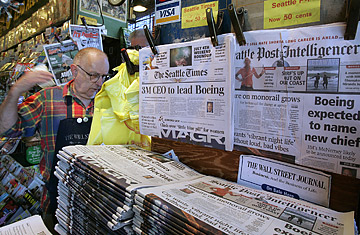
The Seattle Post-Intelligencer on sale at a newsstand in Seattle
Ever wanted to know what a death sentence feels like? You can get a pretty good idea over at the Seattle Post Intelligencer. On Jan. 9, Steve Swartz, an executive from Hearst, announced in the newsroom that the company was putting the money-losing newspaper, known locally as the P-I, up for sale for 60 days.
As you might expect of any news broken in an actual newsroom, the whole thing is captured on grainy video. One reporter holds a digital recorder; a photographer snaps away. The executives wear shirtsleeves with ties askew. When Swartz, looking not unlike a man condemned, says, "At the end of the sale process, we do not see ourselves publishing the P-I in print," he has to raise his voice to be heard over unanswered phones and garbled bursts from the police radio.
All the reporters know that the chances of a sale are slim. "I'd say infinitesimal," says Bill Virgin, one of the paper's business columnists. "It was only the third most significant regional economic news I wrote about that day." Given that such metropolitan papers as the Rocky Mountain News, the San Diego Union Tribune and the Austin American Statesman have not exactly been fending off eager buyers since being put up for sale last year, and given that the P-I lost $14 million last year, it looks unlikely that the publication will last past March, at least as a full-fledged newspaper. (See the 10 worst business deals of 2008.)
So what does a newspaper's editorial staff do when faced with the deadliest of deadlines? It does what any modern news organization would do. Or what any disgruntled employee would do. Or any spurned teenager with fingers. It writes about itself on the Internet. On Sixty Days, different journalists, including managing editor David McCumber, are covering the P-I's two-month drain circle day by day. The blog has brief historical stories about the paper, the video of Swartz's fateful announcement and accounts of McCumber's attempts to find a buyer and handle editorial meetings. All of which means that the closest account of the paper's death walk will be delivered via the instrument that partly brought it about. (Read "Do Newspapers Have a Future?")
McCumber started Sixty Days, it seems, almost as a pre-emptive strike against other blogs that cover Seattle. "I'll be looking for ideas as we go along," he says. But he's not averse to batting the paper's eyelids at any civic-minded Seattleite with deep pockets. "[The P-I has] so many strengths," he wrote, "and I'm going to hammer relentlessly at them as the online infomercial part of this blog continues in coming days."
The paper has also dispatched general-assignment reporter Dan Richman to cover the story, with Andrea James pitching in. Richman declined to discuss his plans, though some of the columnists have not been so coy. The news "hit like a chunk of loose viaduct," wrote sports columnist Art Thiel. "I expected to react to this somber state of affairs by getting drunk, but I haven't," wrote fellow sports columnist Jim Moore. Editorial cartoonist David Horsey, who, as McCumber puts it, legally owns two Pulitzers, observed that owning a newspaper is "quite suddenly a sucker's bet."
The paper was doomed by the triple threat laying waste to metropolitan dailies everywhere: the massive drop in advertising, particularly home and classified ads; the ready availability of free news online; and the limitations of the corporate parent — although Hearst, which owns 16 daily papers and another 16 magazines in the U.S., is one of the sturdier media giants. The P-I's main rival, the Seattle Times, is owned by a local family and is enmeshed with the P-I in a joint operating agreement. It, too, is in dire straits. Seattle, noted Horsey and others, could become the first major U.S. city without a daily newspaper.
In the meantime, the journalists keep doing their best to lay track and ignore the oncoming train. "We're not so narcissistic to think we're the biggest story in town," says McCumber. "But the amazing journalists here will bring the same amount of effort and skill they bring to any story."
